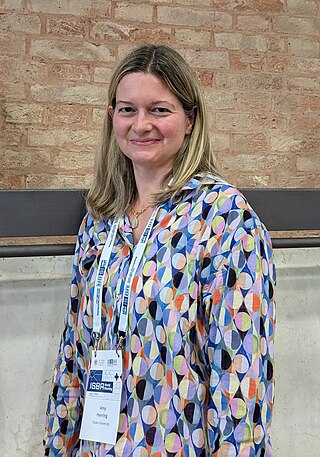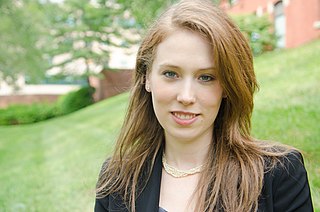Related Research Articles
Lynn Elizabeth Eberly is a professor of biostatistics in the University of Minnesota School of Public Health, whose research involves longitudinal studies, medical imaging, and other forms of correlated data.
Lurdes Yoshiko Tani Inoue is a Brazilian-born statistician of Japanese descent, who specializes in Bayesian inference. She works as a professor of biostatistics in the University of Washington School of Public Health.
Louise Marie Ryan is an Australian biostatistician, a distinguished professor of statistics in the School of Mathematical Sciences at the University of Technology Sydney, president-elect of the International Biometric Society, and an editor-in-chief of the journal Statistics in Medicine. She is known for her work applying statistics to cancer and risk assessment in environmental health.
Mei-Ling Ting Lee is a Taiwanese-American biostatistician known for her research on microarrays. She is a professor of epidemiology and biostatistics at the University of Maryland, College Park, and the founding editor-in-chief of the journal Lifetime Data Analysis. She was president of the International Chinese Statistical Association for 2016.
Arlene Sandra Ash is an American statistician who works on risk adjustment in health services. She is a professor of Quantitative Health Sciences in the University of Massachusetts Medical School, and chief of the Biostatistics and Health Services Research division there.
Janet D. Elashoff is a retired American statistician, formerly the director of biostatistics for Cedars-Sinai Medical Center and professor of biomathematics at UCLA.

Amy Helen Herring is an American biostatistician interested in longitudinal data and reproductive health. Formerly the Carol Remmer Angle Distinguished Professor of Children's Environmental Health at the University of North Carolina at Chapel Hill, she is now Sara & Charles Ayres Distinguished Professor in the Department of Statistical Science, Global Health Institute, and Department of Biostatistics & Bioinformatics of Duke University.
Shelley Hurwitz is an American biostatistician. She is the Director of Biostatistics in the Center for Clinical Investigation at Brigham and Women's Hospital, and an associate professor in the Harvard Medical School.
Telba Zalkind Irony is a Brazilian statistician, operations researcher, and proponent of Bayesian statistics. She works at the Food and Drug Administration, where she was formerly chief of biostatistics at the Office of Device Evaluation and is now deputy directory of biostatistics and epidemiology at the Center for Biologics Evaluation and Research.
Dalene Kay Stangl is an American statistician known for development and promotion of Bayesian statistical methods in health-related research.
Susan S. Ellenberg is an American statistician specializing in the design of clinical trials and in the safety of medical products. She is a professor of biostatistics, medical ethics and health policy in the Perelman School of Medicine at the University of Pennsylvania. She was the 1993 president of the Society for Clinical Trials and the 1999 President of the Eastern North American Region of the International Biometric Society.
Barbara C. Tilley is an American biostatistician.

Bhramar Mukherjee is an Indian-American biostatistician, data scientist, professor and researcher. She is currently serving as the inaugural Senior Associate Dean of Public Health Data Science and Data Equity at the Yale School of Public Health from August 1, 2024. She is also appointed as Anna MR Lauder Professor of Biostatistics, Professor of Epidemiology with secondary appointment as Professor of Statistics and Data Science at Yale University.
Janet Suzanne Sinsheimer was an American expert in statistical genetics who worked as a professor of human genetics, biomathematics and biostatistics in the Fielding School of Public Health at the University of California, Los Angeles. Topics in her research included genome-wide association studies, epigenetics, and Bayesian methods for phylogenetics.

Sherri Rose is an American biostatistician. She is an associate professor of health care policy at Stanford University, and once worked at Harvard University. A fellow of the American Statistical Association, she has served as co-editor of Biostatistics since 2019 and Chair of the American Statistical Association’s Biometrics Section. Her research focuses on statistical machine learning for health care policy.
Rebecca Allana Hubbard is an American biostatistician whose research interests include observational studies and the use of electronic health record data in public health analysis and decision-making, accounting for the errors in this type of data. She is a professor of biostatistics in the Perelman School of Medicine at the University of Pennsylvania.
Mary Elizabeth Landrum is a British-American statistician specializing in biostatistics, examining health services and the quality of health care delivery. She is a professor in the Department of Health Care Policy of the Harvard Medical School.
Judith D. Goldberg is an American biostatistician and a professor in the New York University Grossman School of Medicine. Her research interests include the statistics of medical tests used for screening and medical diagnosis, clinical trials, and observational studies.
Lu Wang is a Chinese-American biostatistician whose research topics have included causal inference, dynamic decision-making for medical treatments, missing data, and environmental health. She has also studied the correlation between mercury from seafood and autoimmune disease, and the benefits of providing improved transportation services for healthcare, as a member of the Michigan Institute for Healthcare Policy & Innovation. She is a professor of biostatistics and associate chair for research in biostatistics in the University of Michigan School of Public Health.
Nandita Mitra is an American biostatistician, and a professor in the Department of Biostatistics and Epidemiology of the Perelman School of Medicine at the University of Pennsylvania. Her research topics include causal inference, health economics and cost-effectiveness analysis, difference in differences estimation, and statistical applications in public health and cancer research. She is editor-in-chief of Observational Studies.
References
- 1 2 3 4 5 Sharon-Lise Normand, PhD, Harvard Medical School Department of Health Care Policy, retrieved 2017-11-24
- 1 2 3 "Sharon-Lise Normand", Our alumni, University of Toronto Dalla Lana School of Public Health, retrieved 2017-11-24
- 1 2 3 4 Curriculum vitae (PDF), June 2017, retrieved 2017-11-24
- ↑ ASA Fellows list, American Statistical Association, retrieved 2017-11-24
- ↑ Distinguished Scientist Recipients, American Heart Association, retrieved 2017-11-24
- ↑ Founding of HPSS, American Statistical Association Health Policy Statistics Section, retrieved 2017-11-24
- ↑ Cupples Award for Excellence Goes to Harvard Biostatistics Professor Sharon-Lise Normand, Boston University School of Public Health, 2015-04-22, retrieved 2017-11-24